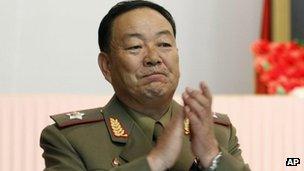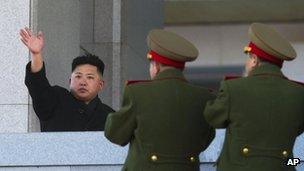North Korea: 'Purge' sees general confirmed as army chief
- Published

Hyon Yong-chol replaces the enormously powerful Ri Yong-ho
A previously little-known general, Hyon Yong-chol, has been confirmed as chief of the North Korean army.
Gen Hyon rose to sudden prominence on Monday when he was promoted following the abrupt demotion of the powerful former army chief, Ri Yong-ho.
Meanwhile, the title of marshal has been bestowed upon North Korean leader Kim Jong-un, state media said.
Analysts said the reshuffle appeared to be an attempt by the young leader to stamp his authority on the army.
He was anointed as leader following the death of his father, Kim Jong-il, last December.
Mr Kim, believed to be in his late 20s, has carried out a number of innovations to the leadership role - addressing the nation directly, acknowledging past hardships afflicting North Koreans, and adopting a lighter-hearted public persona than his father.
But the apparent purge also suggests he is not averse to employing well-worn North Korean tactics to ensure loyalty to the leadership, some analysts said.
Meteoric
Gen Hyon was not formally announced as army chief, but the title was used when he was introduced at a military meeting in Pyongyang on Wednesday, reports said.
His initial elevation to vice-marshal was announced on Monday, following Sunday's surprise removal from office of his predecessor.

Kim Jong-un became North Korea's leader after his father died in late 2011
Ri Yong-ho's demotion was attributed to illness, but has been widely interpreted by analysts as political. Mr Ri was also army chief, and analysts had anticipated Mr Hyon would also take that role.
Earlier, "a decision was made to award the title of Marshal of the DPRK [North Korea] to Kim Jong-un, supreme commander of the Korean People's Army", said official North Korean media.
The title - the top functioning military rank - was held by both Kim's late father and grandfather, North Korean founding father Kim Il-sung.
The country's highest formal military rank - that of generalissimo - was posthumously awarded to Kim Jong-il in February, when the country marked what would have been his 70th birthday.
It is a meteoric rise for the previously little known Mr Hyon, who was made a general in 2010, analysts say.
It appears to signal a dramatic attempt by Kim Jong-un to assert control over an army whose influence burgeoned under the "military first" policy adopted by his father.
Observers have also highlighted a "generational shake-up" taking place in the military, with older leaders being replaced by figures several years younger.
Power 'reconstitution'
Ri Yong-ho was extremely powerful: as well as army chief he was vice-chairman of the powerful Central Military Commission and held top posts in the ruling Workers' Party.
He had been seen as a key figure in the recent transition of power to the young leader.
''What we are seeing is a reconstitution of the North Korea leadership from the old guard who were loyal to Kim's father to a new guard,'' Jasper Kim of the Asia Pacific Global Research Group told the BBC.
Mr Kim and those around him are being keenly watched for the direction in which they will take the communist state.
North Korea - which remains technically at war with South Korea - conducted nuclear tests in 2006 and 2009, since when international talks on ending its nuclear ambitions have been stalled.
It also launched a rocket in April, saying it wanted to put a satellite into orbit. The US and North Korea's neighbours said the launch - which failed - was a long-range missile test that violated UN resolutions.